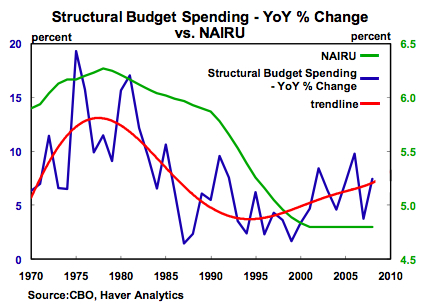Clive Crook has a long and lively exchange with Harvard’s Robert Barro on Keynesian multipliers, Ricardian equivalence, and economic etiquette.
Wolf vs. Wesbury
The FT’s Martin Wolf is beyond pessimistic on the economy. “Worse than Japan,” he thinks. But probably not as bad as the 1930s. Wonderful. He does, however, think the U.S. and other government spending binges will at least help.
But Brian Wesbury unveils a new chart showing how government spending and unemployment are correlated, beyond the normal cyclical boosts in recessionary government spending. This reinforces work by Alberto Alesina, Robert Barro, and others.
“the worst bill since the 1930s”
Harvard’s Robert Barro interviewed about Keynesian spending, tax cuts, Paul Krugman, and. . .
Tax cuts are bound to be better. I think the best evidence for expanding GDP comes from the temporary military spending that usually accompanies wars — wars that don’t destroy a lot of stuff, at least in the US experience. Even there I don’t think it’s one for one, so if you don’t value the war itself it’s not a good idea. You know, attacking Iran is a shovel-ready project. But I wouldn’t recommend it.
Report from a far-away capital
David Brooks at his best:
zeros have lost their meanings. The amount of consideration once devoted to a proposal costing $3 billion is now devoted to a proposal costing $300 billion. Americans have entered the age of budgetary infinity. . . .
Your humble ambassador has heard analysts casually tick off the elements of the Obama plan: enact the largest infrastructure project in 50 years, initiate the broadest tax cut in history, reorganize 14 percent of the American economy, replace the carbon-based economy with a renewable-energy economy, restructure the auto industry, perhaps even rescue the Detroit Lions.


